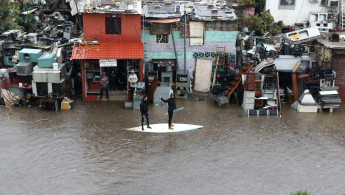Lebanon's neglected infrastructure turns heavy rain into biblical floods, killing two, furious protesters say
The flooding, exacerbated by government failure to provide adequate infrastructure after the close of Lebanon's civil war, came amid nearly two months of protests against the country's entrenched political elite.
Demonstrators have demanded the overthrow of the sectarian political system, in which protesters say politicians enriched themselves at the expense of the country.
|
|
Every year when it rains, roads are flooded with water due to an inadequate sewage system.
The rain began to fall on Sunday morning and has affected the entire country, but Beirut and its suburbs have been worst affected, with videos shared on social media depicting a deluge flooding streets across the capital, stranding motorists in their vehicles. Homes and other buildings in some areas have also been damaged.
One video showed the damage reaching Beirut's Rafik Hariri International Airport, where transiting passengers were pictured walking under a leaking ceiling.
A tunnel that passes under the airport was also closed for hours because pumps that clear water from inside it didn't work.
A man was seen using a surf board to pass through the tunnel, while in other parts of the city some residents used small boats to get around.
Outrage over flooding deaths
Aboudi Kakhiyeh and his sister Maryam were killed in the northern city of Tripoli when the roof of their house collapsed on Monday due to the rain, The Daily Star reported. The tragedy came just three days ahead of Aboudi's engagement
|
|
Angry protesters descended on the municipality building of the Tripoli district of Mina to demonstrate against the tragic incident on Tuesday, smashing windows and setting a room on fire. TV footage also showed a police car turned on its side, with its windshield broken.
Residents of the district told LBC that the roof collapse was the result of municipal negligence, alleging that the municipality had repeatedly ignored calls by the owners to repair the house, saying it would require special paperwork.
Protesters later gathered outside the home of Mina Mayor Abdel-Kader Alameddine, mayor of the Tripoli district of Mina. As source at the mayor's office claimed the family had not applied for the necessary permissions.
A source at Mina Municipality said that the mayor told him that the residents had not applied for the necessary permissions.
Fears of further damage and deaths loom as more heavy rain is predicted to fall on Thursday and Friday.
Outgoing Minister of Public Works and Transportation Youssef Fenianos blamed the crisis on what he said was 50-year-old infrastructure coupled with population increases in some areas.
He added that as a result of Lebanon's recent economic and financial crisis, it was difficult to open lines of credit for infrastructure work.
"I am ready to take full responsibility," the minister said during a news conference.
Fenianos was part the government of former Prime Minister Saad al-Hariri, who resigned in late October under fire from the anti-government protesters.
Negotiations to form a new government are currently at a stalemate as Lebanon spirals further into economic crisis.
Hospitals in deepening crisis
Human Rights Watch warned on Tuesday that Lebanese hospitals might soon be unable to provide patients with life-saving surgery and emergent care.
Medical professionals in the country staged a strike last month after repeatedly calling on the government to reimburse public and private hospitals funds they are owed. Combined with the ongoing dollar shortage, hospitals are increasingly unable to purchase key medical supplies or pay staff.
"The Lebanese government's failure to pay its bills to medical facilities seriously endangers the health of the population," said Joe Stork, deputy Middle East director at Human Rights Watch. "While politicians horse-trade over a new cabinet, the government is not responding to the desperate economic situation in the country and the clock is ticking on the ability of many doctors and hospitals to treat patients."
Agencies contributed to this report
Follow us on Twitter and Instagram to stay connected





 Follow the Middle East's top stories in English at The New Arab on Google News
Follow the Middle East's top stories in English at The New Arab on Google News
![Israeli forces ordered bombed Gaza's Jabalia, ordering residents to leave [Getty]](/sites/default/files/styles/image_330x185/public/2176418030.jpeg?h=a5f2f23a&itok=_YGZaP1z)

